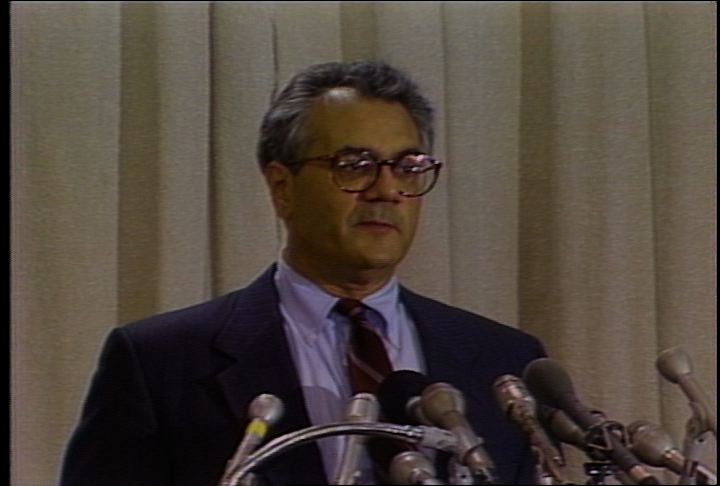
Description:
David Boeri reports on a legislative hearing about urban issues in the Roxbury neighborhood, where city and state officials addressed the panel. Mayor Ray Flynn, District Attorney Newman Flanagan, and Judge Julian Houston of the Roxbury District Court address the panel. Boeri reports that the congressmen were interested in the Dorchester Youth Collaborative (DYC) program. Emmit Folgert of the DYC, along with Dorchester teens Lawrence McKinley and Andrew Young address the panel. They talk about gang activity in the neighborhood. Boeri reports that many teen counselors believe that drug education and prevention should focus on the after-school hours. DYC offers entertainment, music, sports, and a safe place for teenagers. Interview with Al McClain of DYC, and Dorchester teens William Woods, Abigail Santana, and Mickey McBride about the DYC. The teens dance and hang out at DYC. Boeri reports that the congressmen are being urged to fund community centers like the DYC.
This edition of the Ten O'Clock News also included the following item: Carmen Fields interviews Shirley Caesar
1:00:13: Visual: Footage of speakers addressing a congressional hearing in Roxbury. The congressional panel includes Congressman Joseph Moakley and Charles Rangel. Shots of Ray Flynn (Mayor of Boston) addressing the panel; of Newman Flanagan (District Attorney) addressing the panel; of Julian Houston (judge, Roxbury District Court). Shots of the panel. Shot of William Celester (Deputy Superintendent, Boston Police Department). David Boeri reports that legislators on the panel at the congressional hearing wanted to hear from residents of Roxbury and Dorchester; that the panel first heard from Michael Dukakis (Governor of Massachusetts), Flynn and other officials. V: Shots of African American attendees at the meeting. Shot of Georgette Watson (Roxbury resident) at the hearing. Audio of Emmet Folgert (Dorchester Youth Collaborative). Folgert says that the US has given up on poor urban teens; that poor urban teens have given up on America. Shots of audience members. Footage of Lawrence McKinney (Dorchester teen) describing the gang culture in his neighborhood. Footage of Andrew Young (Dorchester teen) talking about dangerous gang members in his neighborhood. Shots of the exterior of the Dorchester Youth Collaborative (DYC); of a sign for the DYC. Shots of teenagers entering the DYC. Boeri reports that the DYC is a safe haven for many teens; that Congressman are interested in the DYC program. V: Shots of a white girl and an African American girl dancing to music in a room at the DYC; of other teens in the room with the girls. Boeri reports that drug activity takes place after school. Boeri notes that counselors think that drug education and prevention should be focused on after-school hours. V: Footage of Al McClain (DYC) being interviewed by Boeri at the DYC. Boeri asks McClain what the teens would be doing if they were not at the DYC. McClain says that the teens would probably be out on the streets; that they might get into drugs. Footage of William Woods (Dorchester teen) saying that he does not want to get into trouble. Boeri reports that the DYC offers entertainment, music, and sports; that some kids go to the DYC to do their homework. V: Shots of teens at the DYC; of a two boys dancing to music in a room at the DYC. Footage of Abigail Santana (Dorchester teen) and Mickey McBride (Dorchester teen) being interviewed by Boeri at the DYC. Boeri asks about the activity on the streets. Santana says that people are drinking alcohol on the streets. McBride says that people are selling drugs and shooting each other. McBride says that she likes being at the DYC. Boeri stands outside of the entrance to the DYC. Boeri reports that DYC counselors complain that President George Bush's drug program directs funding to jails, schools, and treatment centers; that the drug program does not fund community centers like the DYC. V: Footage of McClain saying that the teens at the DYC are like a big family; that the teens try to reach out to others who are on the streets. Shots of two boys dancing to music at the DYC. The boys are wearing WGBH T-shirts. Boeri reports that Congressmen are being urged to take a closer look at DYC. V: Footage of Emmet Folgert (DYC) speaking at the congressional hearing. Folgert says that community centers should be funded; that community centers provide positive adult role models. Shot of the two boys dancing at the DYC.
Date Created:
10/06/1989










